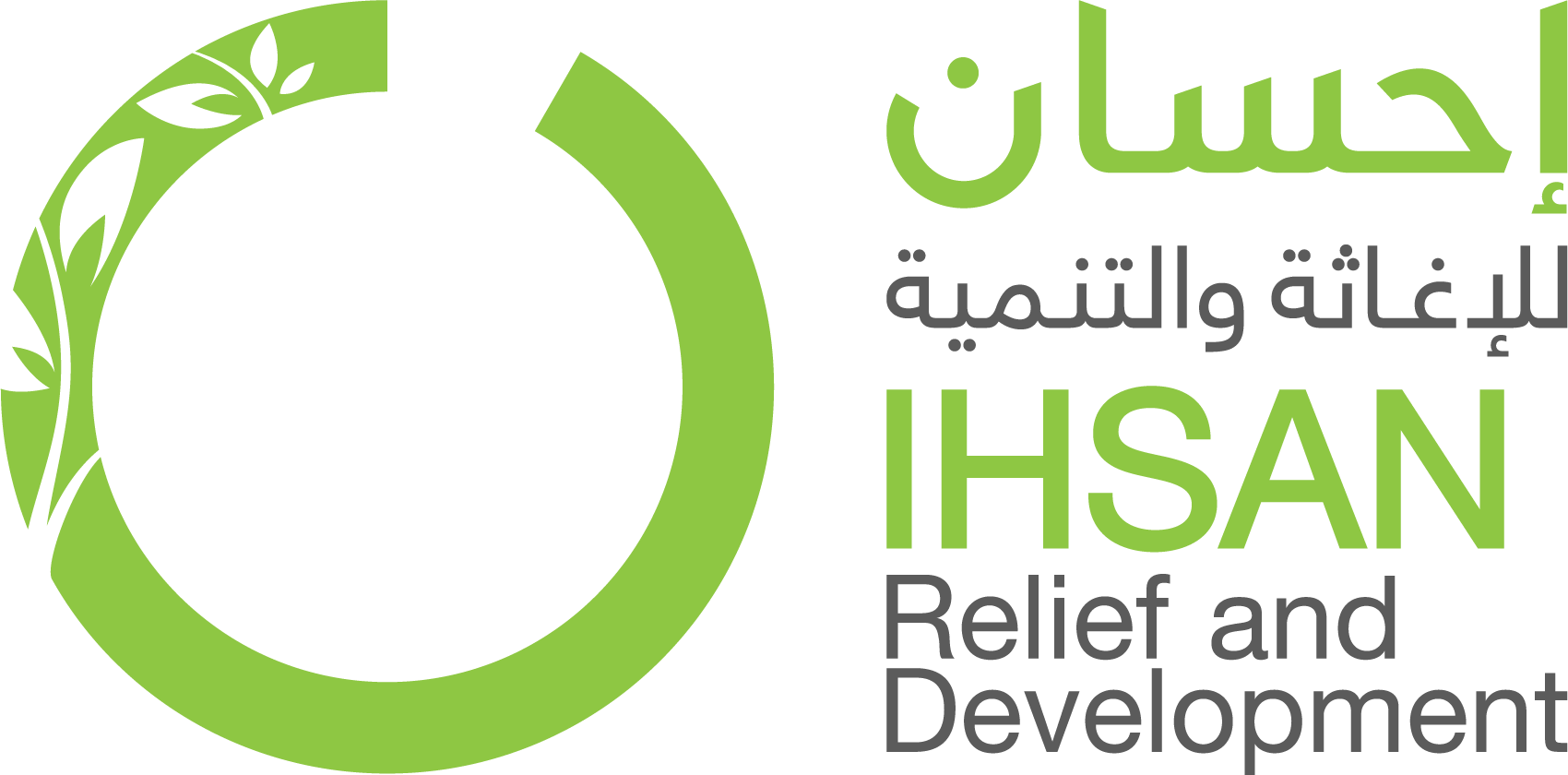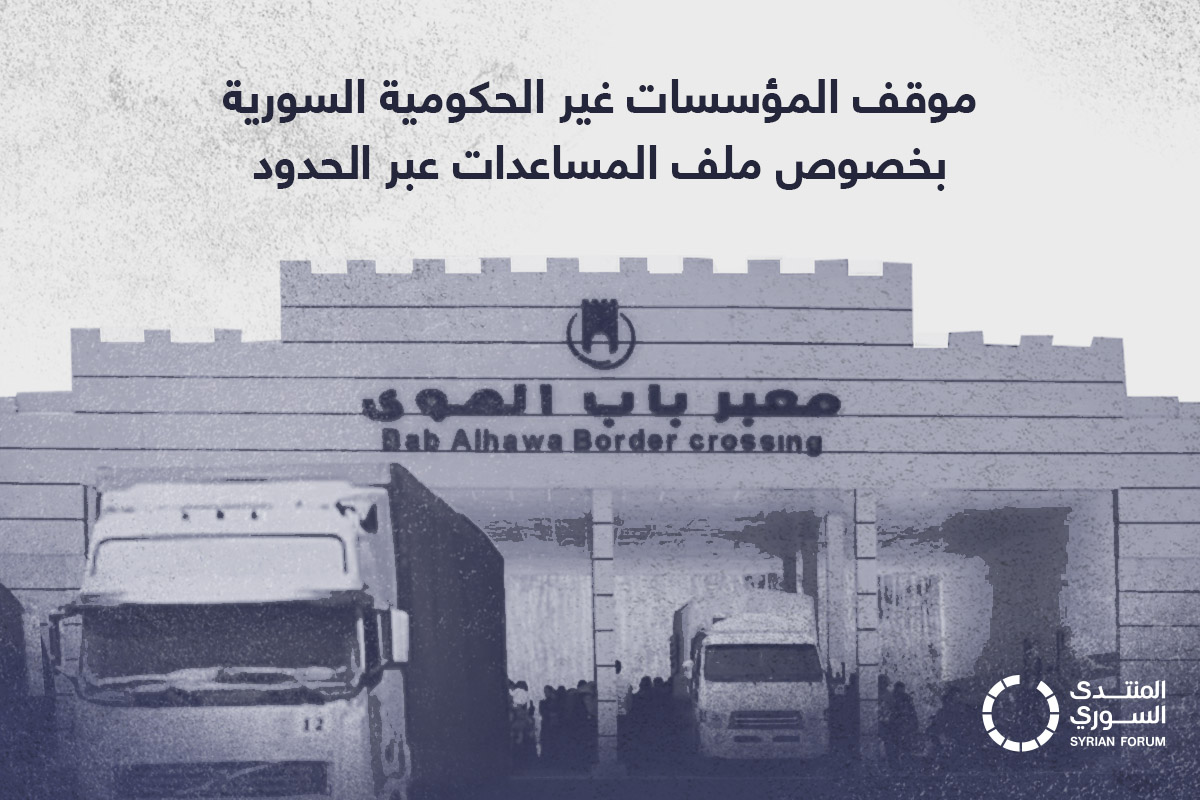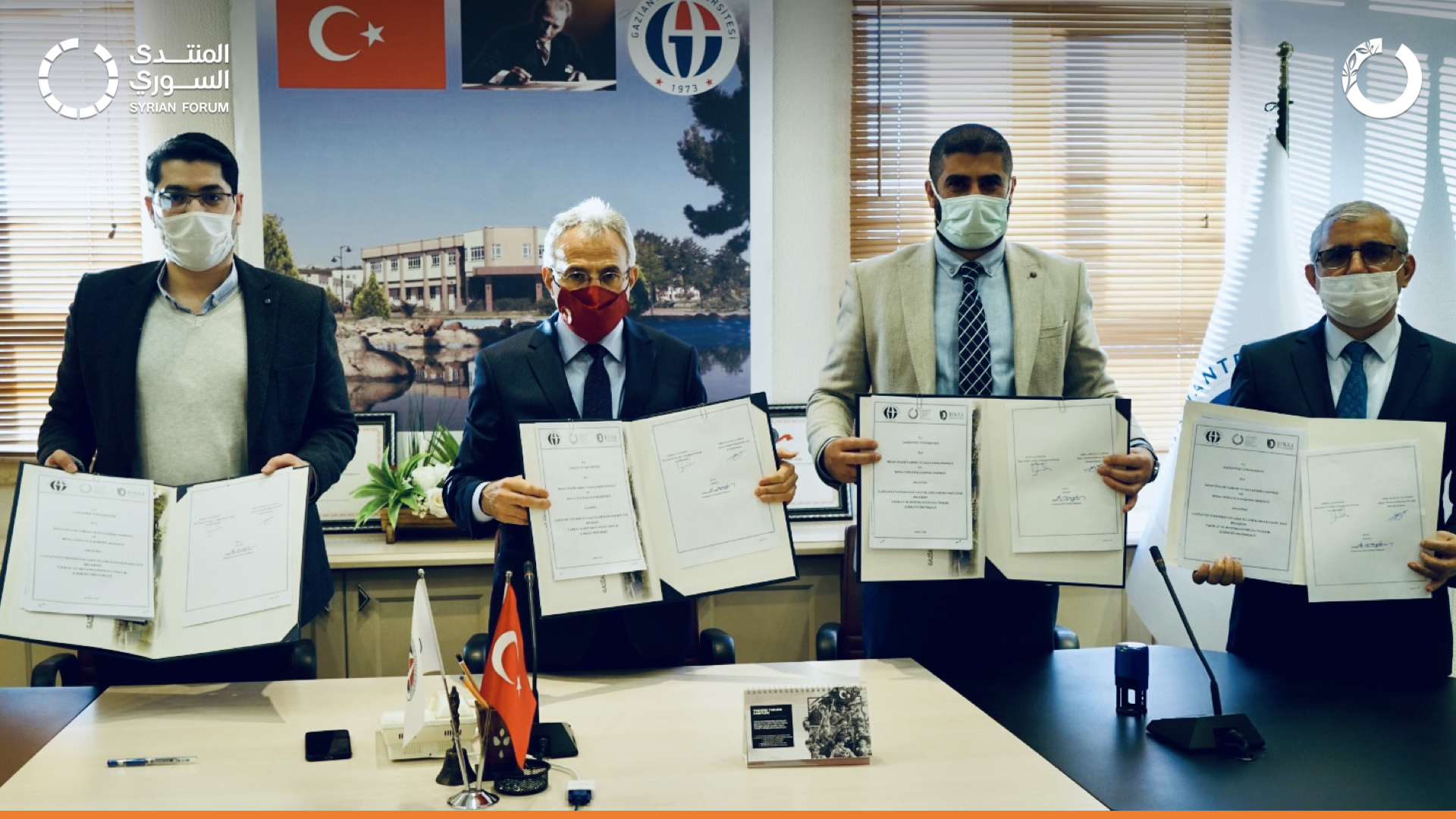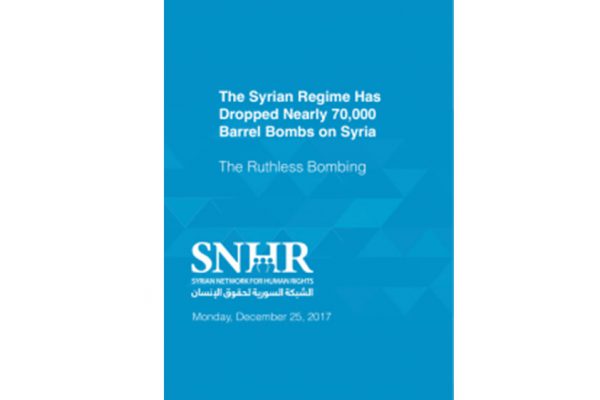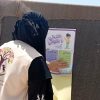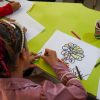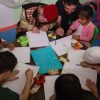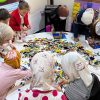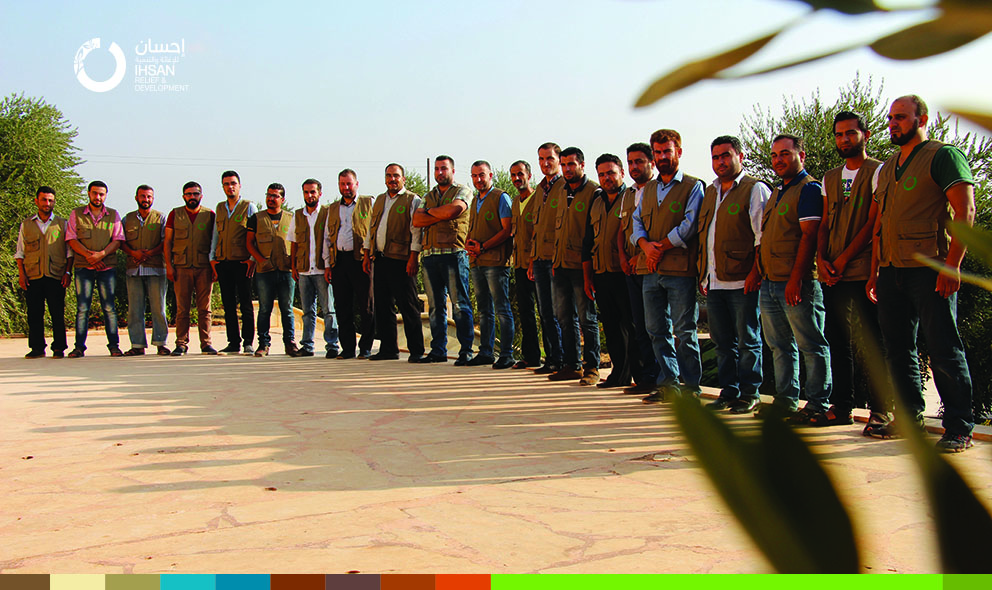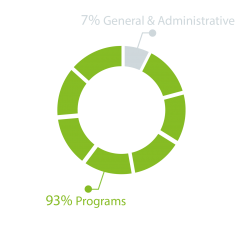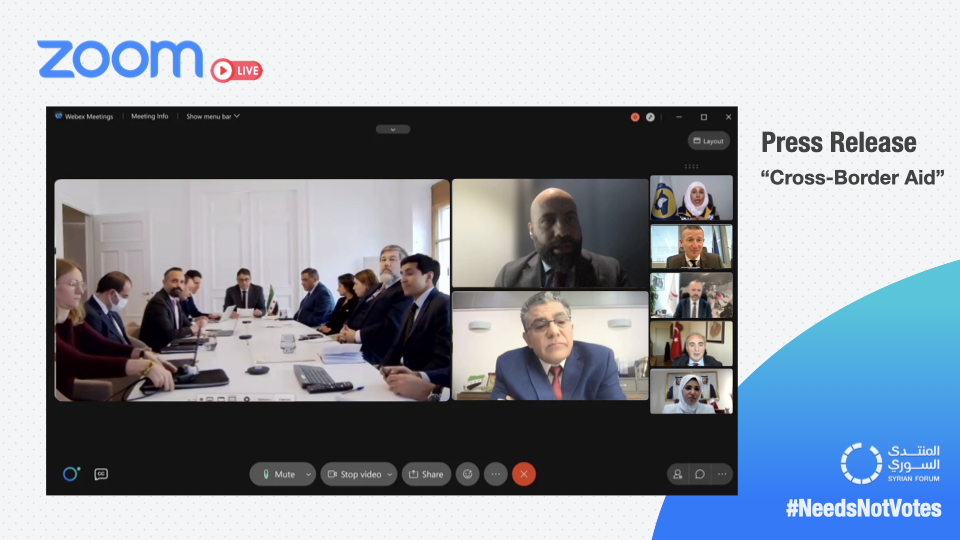
The Syrian Forum participated in a virtual meeting on “Cross-Border Aid” in the presence of representatives of Friends of Syria countries and speakers from Syrian and international civil society organizations.
At the invitation of the Syrian Higher Negotiation Commission, the Syrian Forum participated in the virtual meeting held in Geneva with ambassadors of the countries of the Friends of the Syrian people and speakers from Syrian and international civil society organizations.
The importance of continuing cross-border delivery of humanitarian aid and the humanitarian and field conditions in northwestern Syria was discussed.
The meeting was inaugurated by Bader Jamous, the head of the Syrian Higher Negotiation Commission, with the participation of a number of representatives of Syrian and international civil society organizations, such as the White Helmets, the American Relief Coalition for Syria (ARCS), the Syrian Forum, the Turkish Red Crescent, and GOAL Global. The meeting was facilitated by the Executive Director of the Local Councils Support Unit, Bahjat Hajjar.
Representatives from the United States of America, the European Union, the United Kingdom, Turkey, Qatar, France, Germany, and Canada also participated.
For his part, the CEO of the Syrian Forum, Ghassan Hitto, gave a briefing on the importance of continuing to deliver cross-border humanitarian aid to Syrian people and the role played by Ihsan for Relief and Development providing services to more than four million Syrians this past year.
Hitto stressed the importance of efforts made by all countries friendly to the Syrian people. He added that Syrians need the cross-border mechanism for humanitarian aid delivery to continue and called on the international community to further strengthen the work of this mechanism instead of spending time advocating for its continuation.
He also praised the role of international organizations and the continued pressure on the Russian Federation, which is trying to obstruct the delivery of humanitarian aid to more than 6 million Syrians, most of whom are internally displaced.
In his speech, Hitto said, “There is no need to repeat numbers and show charts about the massive humanitarian need in Syria, not only in opposition-held areas but all over Syria. It is also clear that the regime’s security services and bureaucratic structures are steeped in corruption, and its officials steal. Humanitarian aid is from those in need, so how can we trust them with cross-line operations, especially since they are already proven.”
Hitto stressed that “The crimes against humanity that they committed in Syria confirmed that human lives have no value for them.”
While stressing the importance of the role of Syrian NGOs, which are preparing to face the upcoming challenges, Hitto insisted that the United Nations needs to continue using the cross-border aid delivery mechanism, saying: “The failure to renew the decision on cross-border operations will lead to a clear inability of the United Nations and its partners to Continue to provide assistance, and there is no substitute for the UN-run cluster system, which is the main tool for coordinating all humanitarian operations in the north and northwest as well as throughout Syria.”
Syrian Forum

UNDER-SECRETARY-GENERAL FOR HUMANITARIAN AFFAIRS AND
EMERGENCY RELIEF COORDINATOR, MARK LOWCOCK
Statement to the Security Council on the humanitarian situation in Syria
Amman, 30 October 2017
As delivered
Madame President,
This is my second briefing to you on the humanitarian situation in Syria. In Amman today I have
discussed the position with the Jordanian authorities and the UN humanitarian leadership team
based in the region. One conclusion is obvious: the impact of the Syria crisis continues to be
profound. My briefing today focuses on the humanitarian issues inside Syria. High
Commissioner Grandi will speak to you on the refugee situation on Thursday.
More than 13 million people inside Syria still need humanitarian assistance. 6.3 million of them
are exceptionally vulnerable and in acute need as a result of displacement, hostilities, and limited
access to basic goods and services. Conflict and violations of international humanitarian law
continue to be the principal drivers of humanitarian need, with civilians in many parts of the
country enduring massive suffering.
Military operations and hostilities in some parts of the country, particularly in the east, continue
to drive displacement. The number of long-term internally displaced people (IDPs) has decreased
from 6.3 to 6.1 million over the past year, while IDP returns, especially of those temporarily
displaced, have been increasing in some parts of the country. But levels of new displacement
remain high, with some 1.8 million reported to have been displaced between January and
September.
Madame President,
I want to flag some specific current problems which particularly concern me, and then I will
summarise where we are on the humanitarian response.
I am worried about the impact of fighting and airstrikes on civilians and civilian infrastructure in
Raqqa governorate, with scores of civilians reportedly killed in recent months. ISIL may be
largely pushed out of Raqqa, but after years of oppression and almost a year of intense fighting,
humanitarian needs will continue to be large for some time to come. Since the beginning of the
anti-ISIL offensive in November last year, airstrikes and clashes have resulted in more than
436,000 people being displaced from Raqqa to 60 different locations, including in neighbouring
governorates.
I am also concerned for the safety and protection of civilians at risk from unexploded ordinance
throughout Raqqa city, particularly those trying to return to their homes. Despite the directive
issued by local authorities for civilians not to return to the city until it is deemed safe, the UN
anticipates that people will go back to try to check on and protect their homes and their personal
assets.
Further to the east, in Deir Ez-Zor governorate, heavy fighting and airstrikes continue to result in
civilian deaths and injuries. Large-scale displacement also continues, with IOM reporting some
350,000 people displaced since August, including more than 250,000 people in October alone.
In mid-October, in Al Mayadin city and surrounding areas in Deir Ez-Zor governorate, around
15,000 people were reportedly without access to health services following air strikes on the city,
rendering hospitals and medical points inoperable. UNICEF and WHO report that the attacks on
Al Mayadin destroyed a vaccine cold room, with at least 140,000 doses of UN-provided measles
and polio vaccines lost. Until a new cold room is built and the required cold chain equipment –
including solar fridges, cold boxes and vaccine carriers – are delivered, routine immunization for
vulnerable children in the area will be delayed. This is a particular setback for efforts to check
one of the world’s largest polio outbreaks in recent memory, an outbreak which continues to
plague Deir Ez-Zor in particular, with new cases continuing to be reported.
In Homs governorate, over a period of 20 days this month, ISIL reportedly executed at least 128
people in reprisal killings, accusing them of collaboration with the Syrian government.
And an estimated 50,000 Syrians remain stranded in the desert in Rukban on the ‘Berm’ along
the Syrian-Jordanian border. In the last year there have been only two distributions of UN
humanitarian food assistance to these people and it has been four months since the last partial
distribution. As limited commercial supplies are reaching Rukban, access to food is precarious
and the overall situation remains dire. As the winter months approach, this situation will become
even more acute. Ongoing assessments and data collected through the UN health clinic
underscore the fragility of the situation. A long-term durable solution to the plight of these
people has to be found. Meanwhile immediate access to enable life-saving assistance for the
civilian population is critical. Clearly the best approach is to find a solution from within Syria.
We are straining every sinew to do that. Whatever happens, it is our collective duty to avoid yet
another humanitarian catastrophe in Syria.
Madame President,
Nearly three million people in Syria continue to live in besieged and hard-to-reach areas.
In eastern Ghouta daily shelling has continued to be reported in recent weeks. Humanitarian
access to eastern Ghouta – one of the four de-escalated areas where nearly 95 per cent of Syria’s
besieged population lives – has been severely curtailed for months. Since the start of the year
110,000 people have received food assistance, out of an estimated population of nearly 400,000.
Today the UN and partners delivered food, nutrition and health assistance to 40,000 people. An
alarming number of child malnutrition cases have been recorded there, and more than 400 people
with health problems require medical evacuation. I join the call of the World Food Programme
(WFP) and others for unimpeded humanitarian access.
Madame President,
Against this background, the UN and our partners continue to implement in Syria one of the
largest humanitarian operations in the world. We are reaching millions of people on a monthly
basis. For example, in September WFP provided food assistance to more than 3.3 million people,
UNICEF reached over 1.5 million people, and WHO reached over 800,000 people. We have just
completed a major piece of work to analyse implementation of activities so far this year, and I
have separately made available to you new data on that.
I would like to update you on the position on, first, humanitarian assistance to areas controlled by
the Government of Syria; second, cross-line activities; and third, cross-border activities.
Between January and August of this year, UN and NGO programmes, implemented in close
cooperation with various line ministries of the Syrian Government have reached an average of
well over 4 million people a month in government-controlled areas of the country. These
programmes continue to represent the vast majority of our work inside Syria.
Next, cross-line activities. We continue to face considerable challenges in meeting the
humanitarian needs of people in hard-to-reach and besieged locations. As the Secretary-General
pointed out to you in his monthly report, there is an expectation that progress in de-escalation
will result in increased humanitarian access. While we continue alongside others to work hard on
the issue, this has yet to materialize. Since the beginning of the year, on average fewer than a
quarter of the UN inter-agency cross-line convoys requested under the monthly and bi-monthly
plans have been able to proceed. And thus far in October, inter-agency convoys collectively
reached fewer than 200,000 people. On average only 10 per cent of people in besieged locations
were reached with UN assistance each month this year and that is the total we are also at now for
October given the deliveries today.
The removal of life-saving medicines and medical supplies continues. We have briefed you on
that before.
I hope that, in the coming days, real and tangible progress can be made on cross-line activities,
through the trilateral coordination mechanism in Damascus.
Madame President,
As I said last month, it remains our view that cross-border assistance provided for in Security
Council resolution 2165 has been a lifeline. This assistance has allowed the UN to reach millions
of people in need in northern and southern parts of Syria. Since UN cross-border operations
began in July 2014, we have deployed more than 16,400 trucks carrying assistance through
authorised crossings into Syria. On average, aid was delivered to 2.76 million people a month
through cross-border operations between January and August of this year. A considerable
proportion of the many millions in need – in both northern and southern Syria – have been
regularly reached; not just once or twice, but consistently and systematically throughout the last
three years. Our experience with cross-line operations from within Syria, which I have just
referred to, leads us to believe that it would be impossible to reach those people in a sustained
manner from within Syria. I therefore regard a renewal of resolution 2165 as essential. Millions
of people depend on the activities it mandates.
Thank you Madame President.

Date: 30th October 2017
To:
- Guarantor states of the de-escalation agreements
- International donors.
- Humanitarian Leadership.
- UN agencies.
Syrian NGOs signing below received the news about de-escalation zones agreements between conflict parties in and around E. Ghouta in rural Damascus with great cautious. While the agreements stated ceasing military hostilities and increasing humanitarian access, they didn’t define exactly what is meant by this increase, nor did it mention any urgent necessary measures to alleviate the suffering of trapped civilians.
The humanitarian situation in Eastern Ghouta today had reached a catastrophic level. Around four hundred thousand people are suffering from a tight siege in a nearly full absence of commercial and individual movement to and from the besieged Ghauta. The United Nations in Damascus is also suffering from a catastrophic failure in humanitarian access to the besieged rural Damascus, mainly due to the frequent refusal of Damascus government of giving the necessary permissions and also the numerous obstacles, which, in most times, delay or hinder the delivery of humanitarian convoys that have already been approved. Moreover, humanitarian convoys already prepared based on needs assessment are subject to complete changes by Damascus government officials, including removal of many essential life-saving materials. For example, antibiotics are being omitted from medical aids. In addition, humanitarian response analysis reports and access reports to besieged people in Syria do not reflect their living conditions and do not evaluate it as evidence of the effectiveness and the quality of the humanitarian convoys. Rather, they rely on the number of delivered convoys and the number of people in need these convoys are enough for.
A family in the besieged area does not need a food basket once a year, but according to needs assessments, the needs are very severe and cross-sectoral. Inter-Agency convoys delivery patterns show they are very far from covering those needs. Moreover, humanitarian needs of the besieged population are not limited to goods and gifts in kind but are in need of various humanitarian programs such as livelihood, agriculture, psychosocial support and different protection programs. Humanitarian NGOs working in Eastern Ghouta across the border find themselves alone to provide all these programs and to fill the gaps in the context of a severe resource shortage and continuous decrease in funding cross-border humanitarian operations.
Syrian Non-Governmental Organizations signing below request immediately:
- From guarantor states of De-Escalation Zones:
- Full commitment to their obligations and practicing the necessary pressure to improve humanitarian access to the besieged people in Eastern Ghouta via:
- Immediate opening of commercial crossings and allowing free entry and exit of goods in and out of the besieged area as well as preventing extortion and blackmailing which take place at the checkpoints around Eastern Ghouta. These practices cause a sharp rise in the price of goods entering the besieged area.
- Immediate opening of humanitarian crossings to evacuate all the critical medical cases.
- Applying effective monitoring of the mechanisms to approve cross-line convoys and to ensure their continuous flow on a regular basis, including all essential materials identified in accordance with humanitarian needs assessments, especially medical materials.
- From International Donors, Humanitarian Leadership and United Nations agencies:
- Stand up to their responsibilities and provide direct and immediate funding to the non-governmental humanitarian organizations operating in Rural Damascus Eastern Ghouta to enable them to provide immediate assistance to the besieged people protecting them from falling into a real famine that threatens the lives of tens of thousands.
Signatories:
The League of Syrian Networks which consists of:
- Elaf Union for Relief and Development.
- Syria Relief network.
- Syrian General Union – SGU.
- Foundation of Civil Society Organizations.
- Syrian Civil Coalition (TAMAS)
- Platform of Syrian Associations.
- Maan Association.
- Sham Sharif Association.
- Zaid bin Thabit Association.
- Zdni Elman Association.
- Ahl Horan Association.
- The Syrian Alnour Association.
- Emaar Al Sham Humanitarian Association.
- Ataa for Society and Relief.
- Ibn Al-Nafees Association.
- Union of Syrians Abroad Organization.
- Al-Basr Foundation for Humanitarian Services.
- AlTadamon for Development.
- Local Development Organization (IDO).
- Civil Care.
- Syrian Human Care and Development (Msrat(
- Al Sham for orphans care Association.
- International Foundation for Women’s Support.
- Social Development International Association SDI.
- Syrian Association for Humanitarian Development and Support INSURYA.
- Bonyan Organization.
- Takaful Al-Sham Charity Organization.
- Takaflu Association for Orphans Care.
- Syria Al ghad.
- Shamna for Medical.
- Sham Humanity Association.
- Sham Hayat Association.
- Shafaq Sham Charity.
- Grass Alkhair Humanitarian.
- Grass Foundation.
- Insan For Psychosocial Support Association.
- Nour Al Hedaya.
- Humanitarian Relief Association (IYD).
- International Humanitarian Relief Association (IHR).
- Horan Islamic Organization (Ataa).
- Gana Watan Association.
- Al Marifa Authority for Education and Culture.
- Al Marifa Society For Development & Education.
- All For Charty.
- Human development.
- Hema Association.
- Imaar for Reconstruction Association.
- Development of civil society.
- Hayat Association For Charity & Humanity.
- Al-Bonyan Al-Mursub Association.
Syrian NGOs Alliance, Consisted of:
45. Al Sham Humanitarian Foundation – AHF
46. Big Heart Foundation.
47. Binaa Organization for Development.
48. Ghiras Al Nahda.
49. Ghiras Foundation for Child Care.
50. Hand In Hand for Syria.
51. Ihsan for Relief and Development – IRD.
52. Masrrat – The Syrian Establishment For Human Care & Enhancement.
53. Physician Across Continents – PAC.
54.Syrian American Medical Society – SAMS.
55. Syrian Expatriate Medical Association – SEMA.
56. Social Development International – SDI.
57. Syria Relief and Development – SRD.
58. Syria Relief-SR.
59. Takaful Al Sham Charity Organization.
60. Union of Relief and Medical Care Organizations – UOSSM.
61. Orient for Human Relief.
62. Violet Organization for Relief and Development.
63. Shafak
- Other Organizations:
- Adaleh Foundation for relief and development.
- Ahl Al-Balad Organization.
- Al- Ameen for Humanitarian Support.
- Al-Aml Association for Cancer.
- Alkawakibi Organization for Human Rights.
- Alkhadraa Organization.
- Alwafaa Association for Relief and Development.
- Basamat for development.
- Baytna Syria.
- Elaf for Relief and Development.
- Emissa for Development.
- Foundation of Civil Society Organizations.
- Human Rights Guardians.
- Jozour Development & Sciences Organization.
- Masar Research Center.
- Nas Organization.
- Rakeen Organization.
- Sadad Humanitarian Organization.
- Solidarity Organization for Syria.
- Syrian Center for Media and Freedom of Expression.
- Syrian Center for Studies and Human Rights.
- White Hats Organization.
- White Helmets.
- Al-Ghouta youth volunteering team.
- Syrian activists monitoring.
- Damas House.
- Hurras Network.
- Hadith Humanitarian Aid Organization.
- Kudra Social Development Solutions.
- Center for Civil Society and Democray – CCSD.
- Local Development and Small-Projects Support (LDSPS).
- Oppressed Supporters Association.
- Aitam Al-Sham for orphans care.
- Syrian Network For Human Rights-SNHR.
- Syrians for Truth and Justice-STJ.
- Independent Doctors Association.
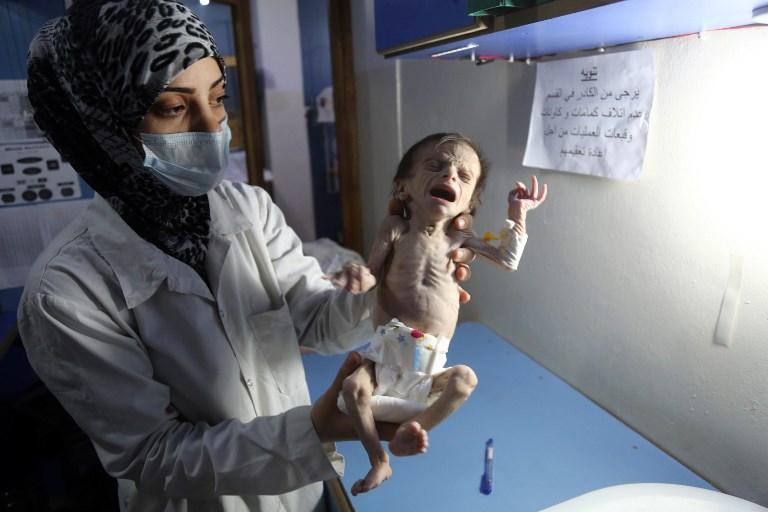
EASTERN GHOUTA (Reuters) – A tightening siege has pushed people to the verge of famine in the eastern suburbs of Damascus, residents and aid workers say, bringing desperation to the only major rebel enclave near the Syrian capital.
Cases of malnutrition among children have almost doubled in the last two months at one clinic in the suburbs, which have been under siege by Syrian government forces since 2013 but come under new pressure this year as tunnels used to smuggle in food have been cut off.
“The child that we consider normal in Ghouta is the child whose weight is on the lowest end of the normal weight scale. We don’t have fully healthy children. The main reason is the lack of food and nutrition,” said Dr Amani Ballour, a paediatrician.
“There are children who we previously classified as at risk of malnutrition, who are now classified as medium-level acute malnutrition or extreme-level acute malnutrition cases.”
At two and a half years old, Hala al-Nufi weighs less than five kilos (12 pounds). She suffers from a metabolic disorder, but a lack of adequate food has made the case extreme.
Hala, her eyes hollow and her translucent skin stretching over her tiny bones, had gotten sicker in recent months, her parents said. They worry she will not survive the siege.
Um Said, a mother of six, says she is too hungry to breast feed her six-month-old twins, Marwa and Safa.
“I put the child to the breast, but there is no milk. I am not eating. I slept without supper last night,” she said.
“Sometimes I hit myself against the wall,” she said. “For God’s, sake open the road. In the name of the prophet, I kiss your hands and feet, open the road for us. We are going to die of hunger. We are eating from the trash bins.”
At least 1,200 children in eastern Ghouta suffer from malnutrition, on the rise with 1,500 others at risk, a spokeswoman for the U.N. children’s agency UNICEF said.
“We could be at the doors of starvation, of a medical catastrophe,” said health worker Mahmoud al-Sheikh. He said children were not yet dying of hunger but could be soon. “God help the people in the coming time.”
Food, fuel and medicine once traveled across frontlines into the suburbs through a network of underground tunnels. But early this year, an army offensive nearby cut smuggling routes that provided a lifeline for around 300,000 people in the enclave.
Supplies have barely entered in months. Shortages have sent prices soaring even higher. Residents and local aid workers say they fear the worst if nothing changes when the cold arrives and stocks run out.
A kilogram of sugar now costs more than 5,000 Syrian pounds ($10.81 dollars), roughly 14 times the state-regulated price in nearby Damascus.
Two malnourished babies died this week after the siege aggravated their illnesses, a local official said. Photos of one of them — a skeletal baby girl — brought widespread attention to a crisis that has been growing there for months.
Linda Tom, a spokeswoman for the U.N. humanitarian affairs office (OCHA) in Syria, said the one-month-old girl, Sahar, had congenital abnormalities. Hunger worsened her condition, and the baby died of pneumonia.
Through a series of offensives and evacuation deals, the Damascus government has defeated opposition pockets around the capital. Eastern Ghouta has held out, but residents say there is now talk for the first time of agreeing to evacuate.
“People are under pressure, they will erupt. There is no baby milk at all. Mothers and fathers are watching their children go hungry. They want a solution in any way, at any price,” said Adnan, 30, who runs a local aid group.
Families relied on crops they harvested in the summer, and meagre food distributions from warehouses run by the opposition government based in Turkey, he said. Adnan’s group had preserved and dried vegetables that it will distribute to 1,500 families next week, but besides that, its food aid has halted.
“Even if I get funding, there are no goods to buy,” he said. “The eastern Ghouta has shut down. There is a state of paralysis.”
The Wafideen crossing at the outskirts, where checkpoints allowed some goods to enter, has also been heavily restricted or shut, the U.N. and residents said. Only two aid convoys have reached the Ghouta since July, each with food and medicine for about 20 percent or less of the population.
In July, Moscow and rebels in the Ghouta signed a ceasefire that had sparked hopes of opening crossings and aid flowing into the suburbs. But residents say none of that has materialized.
The “de-escalation” deal reduced the barrage of air strikes and artillery, but the siege only got harsher, they said. Fierce ground battles also rage on in some frontline districts.
When people in the Ghouta learned of the deal and thought it would bring relief, many began using up their food reserves at home, said Khalil Aybour, head of the local council in the town of Douma. “After they saw it was all rumors,” he said, “the misery grew immensely.”
Source: http://www.reuters.com
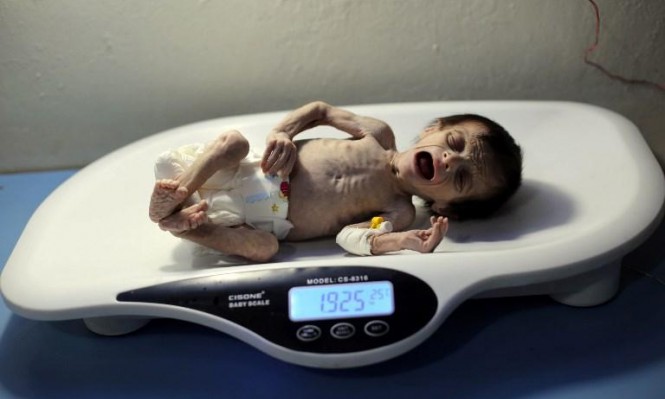

Office for the Coordination of Humanitarian Affairs
Amman, 5 October 2017
I am appalled by reports of high numbers of civilian casualties due to heavy air attacks in Syria. Hospitals, ambulances, schools and displaced people escaping violence have been targeted by direct air strikes resulting in deaths and injuries of innocent civilians. September was the deadliest month of 2017 for civilians with daily reports of attacks on residential areas resulting in hundreds of conflict-related deaths and injuries.
This week, airstrikes on Ar-Raqqa city killed dozens of people and injured many others. Some 8,000 people remain trapped in the city. Between 19-30 September, airstrikes on residential areas in Idlib killed at least 149 people, the majority of whom were women and children. Attacks on medical facilities are depriving people in need of their right to life-saving medical care. Schools and hospital in Idlib have been forced to close due to fear of being targeted. Three explosions in Damascus city caused the death of 20 people and injured 15 more. Civilian casualties were also reported in Rural Damascus, Hama, Aleppo, and Deir-Ez-Zor.
I would like to praise the phenomenal work carried out by humanitarian workers and in particular national staff. Rescue workers on a daily basis risk their lives to help others.
The UN calls on all parties to the conflict to immediately take all measures to protect civilians and civilian infrastructure throughout Syria. Targeting of civilians and facilities including hospitals and other medical facilities is simply unacceptable and constitute a grave violation of human rights and international humanitarian law and may amount to war crimes. All parties to the conflict must respect their international obligations and act in a way that ensures the protection of civilians and humanitarian workers.

Humanitarian Liaison Group
Gaziantep, Turkey
14 September 2017
To all armed groups and civilian administration entities, including humanitarian coordination offices and courts in Idleb governorate and surrounding area:
Reports are being received of impediments to humanitarian access in areas of north-western Syria under the control of armed groups. The humanitarian community serving the cross-border operation to Syria from Turkey, which includes UN agencies, international NGOs and local NGOs, is concerned that vulnerable people are not receiving life-saving humanitarian assistance or are at grave risk of reduced assistance as a consequence of these impediments or the threat of them being imposed.
Humanitarian operations in northern Syria started in early 2012 to cover emergency needs and to provide sustainable longer-term services that benefit IDPs and local communities. These are carried out by the UN and local and international organizations and benefit hundreds of thousands of people on a monthly basis. For example, from January to May 2017 in areas of Idleb, Aleppo, Hama, and Lattakia governorates under the control of armed groups, on average each month more than one million people received some form of humanitarian aid1, whether it was food assistance, emergency health support, clean water, protection services, children receiving nutritional assistance or schooling, shelter, and/ or household materials.
Globally, all humanitarian and relief activities are based on fundamental humanitarian principles. These principles are in support of civilian populations only and are central to ensuring the most vulnerable receive the assistance they need, and include:
- Humanity: Human suffering must be addressed wherever it is found, with particular attention to the most vulnerable people, such as children, women and the elderly.
- Neutrality: Humanitarian assistance will be provided without participating in hostilities or taking sides in controversies of a political, religious or ideological nature.
- Impartiality: When humanitarian assistance is provided, it will be without discrimination on the basis of ethnic origin, political opinion, gender, nationality, race or religion. Provision of assistance is guided solely by needs, and priority is given to the most vulnerable cases.
- Operational Independence: Humanitarian activities must be autonomous from the political, economic, military or other objectives that any actor may have with regard to areas where humanitarian activities are being implemented.
Humanitarian organizations are accountable to uphold these principles. If they fail to do so, there are enforcement and accountability mechanisms within the UN, internally in NGOs, and with the donor that supports the organization. These mechanisms are the appropriate channels to address such issues.
In December 2014, the humanitarian community operating from Turkey adopted the Protocol for Engagement with Parties to the Conflict to Deliver Humanitarian Assistance in Northern Syria2. This document outlines how humanitarian organizations engage with parties to the conflict in northern Syria. It reiterates the above humanitarian principles and gives examples of what the humanitarian community will and will not do in relation to parties to the
conflict. The Protocol provides the framework for this document as well. The related Declaration of Commitment3 complements the Protocol and outlines an armed group’s commitment to comply with international humanitarian law and to facilitate humanitarian assistance according to the humanitarian principles. It was signed by many armed groups in 2014, and remains valid. Key commitments include:
- To respect and protect relief workers, allow and facilitate the rapid and unimpeded passage of relief including medical and surgical equipment, and grant authorized relief personnel freedom of movement to reach people in need on the basis of need alone;
- To respect and uphold the fundamental humanitarian principles of humanity, neutrality, impartiality and independence;
- To adopt simple and expedited procedures for all logistical and administrative arrangements necessary for humanitarian relief operations; and
- To work immediately and in good faith with representatives of humanitarian agencies to agree on practical arrangements for the provision of assistance to meet the needs of all civilians.
The first half of 2017 saw an increase of incidents contrary to the above humanitarian principles, Protocol, and Declaration. Such incidents included, but were not limited to:
- 1) Interference in the implementation of humanitarian activities, including reports of: • Interventions in human resource issues, such as in staff recruitment, or requesting information on salary scales or personal information from staff files.
- Interventions in procurement, asking for tender documents and contracts, and trying to influence NGOs to contract with specific suppliers or traders.
- Requesting NGOs to provide beneficiary lists or other confidential details of program plans.
- Attempting to influence humanitarian programming and to divert aid to unplanned areas, groups or individuals.
- Requesting a percentage of relief items or requesting money.
- Requesting NGOs to register with “NGO affairs offices” related to armed groups.
- Trying to impose specific local organizations as a partner for the implementation of humanitarian programs, some of whom may not be fully humanitarian in nature.
- Limiting or prohibiting certain humanitarian activities especially in certain sectors.
- 2) Physical interference, violence or the threat of violence against humanitarian personnel, assets and facilities, including reports of: • Detention or arrest of humanitarian aid workers for not complying to demands contrary to the above principles, Protocol, and Declaration.
- The seizure of humanitarian property or materials by force.
- Threatening to close NGO offices or to stop their activities if they do not comply with the demands of armed groups.
- Forceful closure of programs.
- 3) Restriction of movement of agencies, personnel, or goods, including reports of: • Unjustified stopping of humanitarian shipments at checkpoints or the seizure of relief items.
The humanitarian community notes recent changes in areas of control in northwest Syria and its potential impact on humanitarian programming. The humanitarian community notes the importance of the Bab Al Hawa border crossing to the delivery of humanitarian aid and urges all parties to ensure that it remains operational for humanitarian shipments, including maintaining the longstanding policy of no taxation on humanitarian goods. As recent experience has demonstrated, humanitarian needs can worsen quickly if the border closes or if the provision of aid is otherwise inhibited. If the humanitarian community is not able to provide
the assistance and services according to the above humanitarian principles and commitments, the humanitarian operation may be at risk and those in authority will need to ensure that civilians receive food, medical treatment, non-food items, water services, shelter, education and protection services, as this is an obligation under international humanitarian and human rights law.
The humanitarian community’s only goal is to serve civilians in need of humanitarian assistance, and urges all armed groups and civilian administration entities, including humanitarian coordination offices and courts, to enable humanitarian workers to do their work. In this regard, the recent statements by some armed groups and their affiliated offices of their willingness to facilitate humanitarian work, including in meetings and official written communication with the humanitarian community, are welcomed. The humanitarian community looks forward to further dialogue on continuing humanitarian assistance in line with the humanitarian principles, Protocol, and Declaration to ensure that people in need receive the aid they require. As a basis for such dialogue we request the recognition and implementation of the following criteria for continued provision of humanitarian services to civilian communities in northwestern Syria:
- Guarantees of protection of the staff, assets and projects of humanitarian agencies in this area. Staff shall not be targeted, assets confiscated or demands placed on projects that are contrary to the humanitarian principles above.
- Acceptance that internal procedures of humanitarian actors such as staff hiring policy, salary scales, procurement processes, decision of geographic location of projects or beneficiary lists are internal to each agency and all requests to include parties external to the NGO in these processes or to share such information must be stopped.
- While recognizing the independence of humanitarian action in northwest Syria, ensuring there is an avenue to deal with the legitimate feedback and complaints against any humanitarian agency that may be in contravention of the above humanitarian principles. Avenues for such complaints and feedback must be determined in the context of dialogue.
- Agreement that reducing the humanitarian needs of affected civilians in northwest Syria is the primary aim of all concerned and confirmation that humanitarian assistance does not serve the aims of any military entity in northwest Syria.
